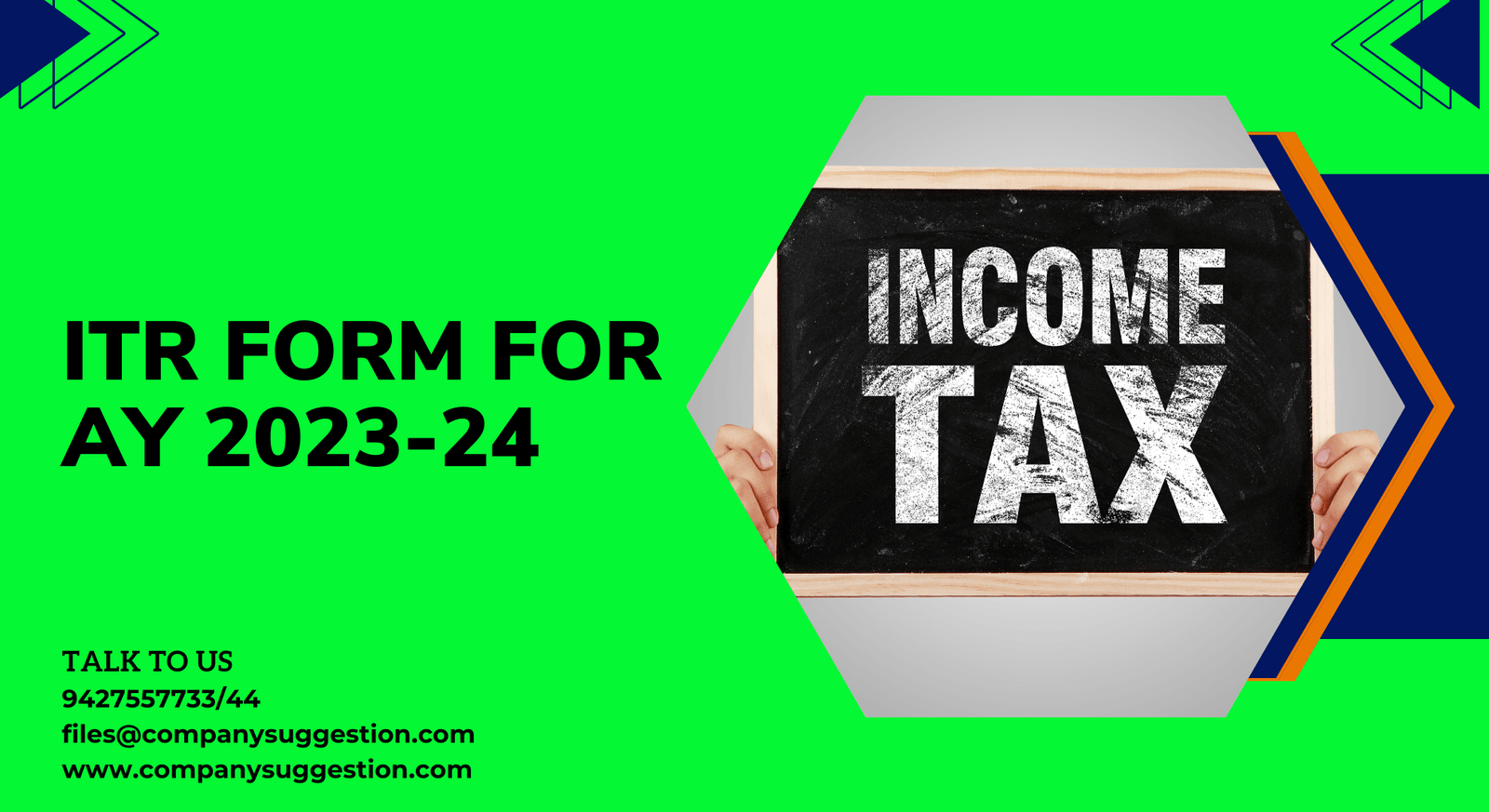ITR FORM FOR AY 2023-24 :
Income Tax Return refers to a document or form filed with the tax authorities that details an individual’s or entity’s income earned during a specific period (usually a fiscal year) and the applicable taxes paid on that income. Income tax returns are typically filed annually by individuals, businesses, corporations, and other entities subject to taxation. The information provided in an income tax return includes various sources of income, deductions, credits, and other relevant financial information required for tax assessment and calculation. The filing of accurate and timely income tax returns is essential for compliance with tax laws and regulations.
why should you file ITR?
Filing Income Tax Returns (ITR) is mandatory for individuals and entities meeting certain income criteria set by tax authorities. Here are several reasons why filing an ITR is important:
- Legal Requirement: Tax laws mandate individuals and entities meeting specific income thresholds to file tax returns. Failure to comply with this requirement can lead to penalties and legal consequences.
- Income Verification: Filing an ITR provides a documented record of your income, which can be useful for various purposes such as loan applications, visa processing, and other financial transactions requiring income verification.
- Claiming Tax Refunds: If you’ve paid more taxes than required through tax deductions or withholdings, filing an ITR allows you to claim a refund for the excess amount.
- Compliance and Avoiding Penalties: By filing your tax return on time and accurately, you demonstrate compliance with tax laws, reducing the risk of penalties, fines, or other enforcement actions by tax authorities.
- Availing Tax Benefits: Many tax deductions, exemptions, and credits are available to taxpayers. Filing an ITR allows you to claim these benefits, reducing your tax liability and potentially saving money.
- Documentation for Financial Planning: Your tax return provides a comprehensive overview of your financial situation, including income, expenses, investments, and assets. This information can be valuable for financial planning and decision-making.
- Facilitating Loan Approvals: Banks and financial institutions often require copies of tax returns as part of their loan application process to assess your creditworthiness and repayment capacity.
- Legal Proof of Income: In case of any legal disputes or requirements, such as in divorce proceedings or property transactions, tax returns serve as official documentation of your income.
Overall, filing Income Tax Returns is not only a legal obligation but also a crucial financial responsibility that helps individuals and entities manage their tax affairs efficiently, claim benefits, and avoid legal and financial repercussions.
When it is mandatory to file ITR in India?
In India, it is mandatory to file Income Tax Returns (ITR) for individuals, Hindu Undivided Families (HUFs), and other entities meeting specific income criteria set by the Income Tax Act, 1961. Here are the general guidelines regarding when it is mandatory to file ITR in India:
- Individuals and HUFs: Individuals below 60 years of age are required to file ITR if their total income exceeds Rs. 2.5 lakh in a financial year (FY). For senior citizens aged 60 years or above but below 80 years, the threshold is Rs. 3 lakhs, while for super senior citizens aged 80 years or above, the threshold is Rs. 5 lakhs.
- Companies: All companies registered in India, whether they have made profits or incurred losses during the financial year, are required to file ITR.
- Partnerships and LLPs: Partnerships and Limited Liability Partnerships (LLPs) are required to file ITR regardless of whether they have made profits or incurred losses.
- Other Entities: Any other entity, including trusts, associations, institutions, etc., that are liable to pay income tax under the Income Tax Act, must file ITR.
- Individuals with Foreign Assets or Income: Individuals who hold any foreign assets or have income from outside India are required to file ITR, irrespective of the amount of income earned.
- Residents with Signing Authority in Foreign Accounts: Individuals who are resident in India and have signing authority in any foreign account are required to file ITR, even if their income is below the taxable threshold.
- Claiming Tax Refund: If an individual is eligible for a tax refund due to excess TDS (Tax Deducted at Source) or advance tax payments, filing ITR is necessary to claim the refund.
- Mandatory for Certain Transactions: Individuals engaged in specific transactions such as buying/selling of immovable property, high-value transactions, etc., as specified by the Income Tax Department, may be required to file ITR, even if their income is below the taxable threshold.
Which ITR to file for FY 2023-2024?
For the financial year (FY) 2023-2024 (assessment year 2024-2025), the appropriate Income Tax Return (ITR) form to be filed in India would depend on various factors such as the nature of income, residential status, and specific financial circumstances of the taxpayer. However, here are the commonly used ITR forms for different categories of taxpayers:
- ITR-1 (Sahaj): This form is for resident individuals having income from salaries, one house property, other sources (excluding winning from lottery and income from racehorses), and having total income up to Rs. 50 lakhs.
- ITR-2: This form is for individuals and Hindu Undivided Families (HUFs) not having income from profits and gains of business or profession. It is applicable for those who have income from sources other than profits and gains from business or profession.
- ITR-3: This form is for individuals and HUFs having income from profits and gains of business or profession.
- ITR-4 (Sugam): This form is for Individuals, Hindu Undivided Families, and Firms (other than LLP) being a resident having total income up to Rs. 50 lakh and having income from business and profession which is computed under sections 44AD, 44ADA, or 44AE.
- ITR-5: This form is for persons other than individual, HUF, company, and person filing Form ITR-7.
- ITR-6: This form is for companies other than companies claiming exemption under section 11.
- ITR-7: This form is for persons including companies required to furnish return under sections 139(4A) or 139(4B) or 139(4C) or 139(4D) or 139(4E) or 139(4F).
It’s essential to carefully select the appropriate ITR form based on your income sources, residential status, and other relevant factors. Additionally, taxpayers should ensure that they meet all the eligibility criteria and comply with the requirements specified for each ITR form. It’s recommended to consult with a tax advisor or chartered accountant for personalized guidance regarding tax filing requirements.
If you have any doubt regarding this, then you can send your doubts on companysuggestion and our team of experts will guide you.












